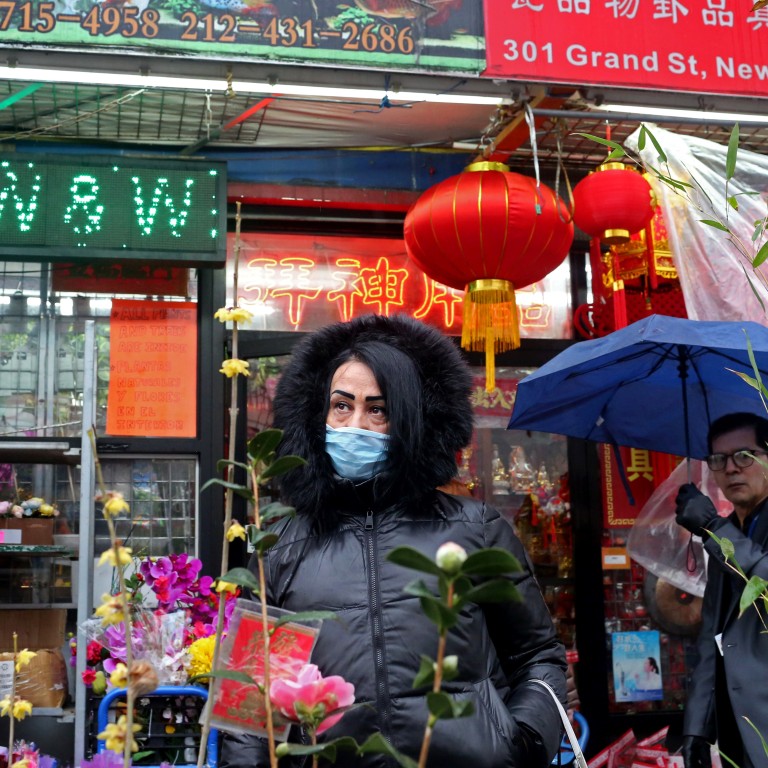
Life in the US: coronavirus is only a trigger for the racism that lies just beneath the surface
- The prejudice is subtle but no less hurtful. By attaching the word ‘virus’ to the Chinese people, there is no need to say anything explicitly racist – the message is clear
On a mild weekend this winter, my wife, three-year-old son and I spent the morning in Central Park. After that, we stopped by a neighbourhood pizza restaurant to grab some food and were heading home.
At the pizzeria’s door, we encountered two teenagers. They opened the door for us and we thanked them. Yet, a split second after this usual courteous exchange, the teenagers looked at us and immediately held up the front of their hoodies to cover their mouths and noses.
We knew what they meant, but we didn’t say anything and walked back home.
On the evening of February 12, my friend texted me that her eight-year old son had been called “China Virus” in school by a classmate. My friend lives in an upper-middle-class suburb in New England.
Cotton stirred a rumour that a research lab in China was the source of the virus. He called the outbreak “worse than Chernobyl”. The sender noted that the video was worth watching.
The speech was, of course, politically charged and implicated the Chinese people and government as the source of the virus. Feeling disturbed, the Chinese engineer replied by email to explain the situation in China, including her family’s struggle and what the World Health Organisation has been working on. The email got zero response.
I recalled what happened to my family over the weekend and knew I could no longer fool myself that it was a one-off incident to be blamed on teenage ignorance. I felt a mix of fear, anger, anxiety and helplessness.
Having been in this country I consider my home for two decades, it was the first time I had felt discrimination so vividly and overwhelmingly.
People say discrimination is caused by ignorance and a lack of communication. Is that true? We can cancel trips to China to keep ourselves from being infected. Yet, we can’t keep ourselves from being the victim of racism. Do I need to print “Did not travel to China in the past 14 days!” on my forehead in large font?
All of a sudden, I realised my understanding of racism, bigotry and prejudice was only a concept
Should we have reasoned with the two teenagers to show why they should not be afraid of us? How much do we have to explain ourselves in order not to be discriminated against? The answer is “never enough”, since the fear is based on my look, my skin colour and my origin.
As a photographer, I have been dealing with social injustice issues for much of my career. I spent many years working on a project in Alabama covering African-American farmers and communities. I covered and marched in the Black Lives Matter movement. I drove to Ferguson, Missouri, and stood in the middle of the road where Michael Brown was shot. All of a sudden, I realised my understanding of racism, bigotry and prejudice was only a concept.

People like to talk about racism as a problem of the South or of the conservatives. However, my encounter occurred in one of the most demographically diverse and ideologically liberal neighbourhoods in Manhattan.
It reminded me of an incident that happened last year in a prestigious American university that a friend witnessed. A professor whose resume is filled with study and achievements on gender, land rights and social justice issues publicly commented that Chinese culture is playing catch-up with Western culture. The coronavirus outbreak is not the cause of racism, yet is used to justified the deeply rooted discrimination.
Naked racism against the Chinese and the pathogen of prejudice
In the 1800s, fear of the spread of smallpox and cholera animated anti-Chinese sentiments that eventually led to the passage of the 1882 Chinese Exclusion Act. Political strategist Lee Atwater, who was known to use racial and ethnic messages to suit his purposes, once said “perception is reality”. By attaching the word “virus” to the Chinese people, there is no need to say anything explicitly racist – all one needs do is to keep talking about “virus”.
In January, our parents stopped us visiting China for the traditional Lunar New Year family reunion. That saved us the trouble of being stuck in China, or – if we were lucky enough to leave – of being quarantined back in the US. My wife’s uncle, aunt and cousins are actually in Wuhan.
Hai Zhang is a Chinese-born photographer based in New York

